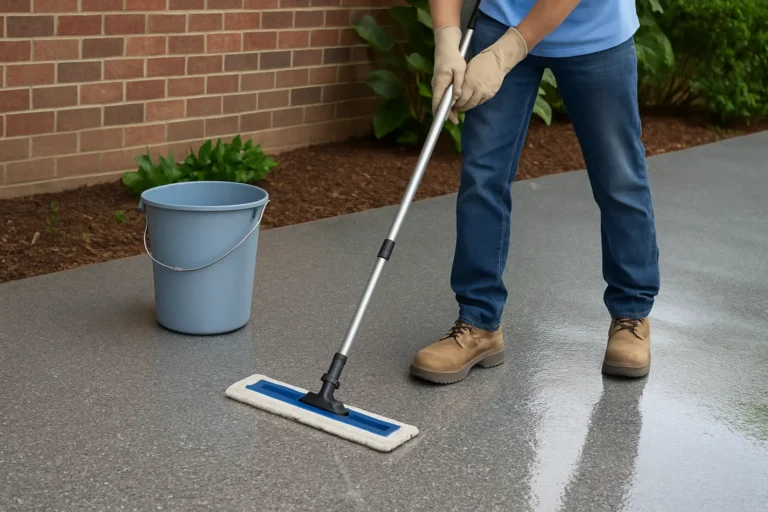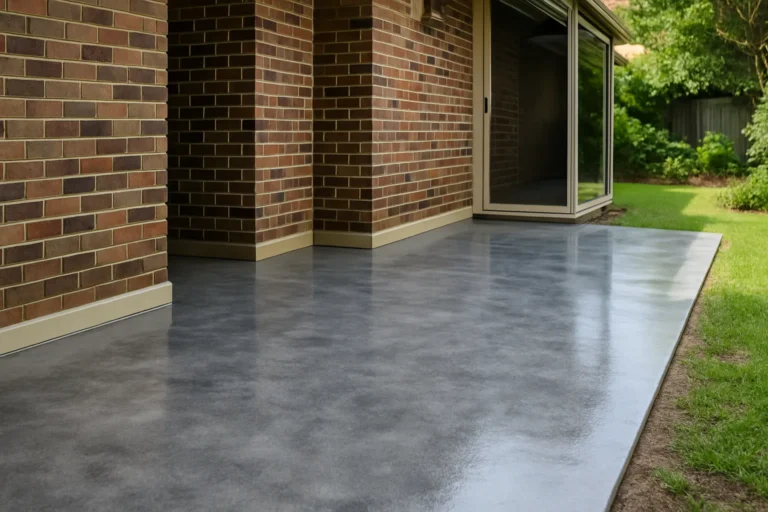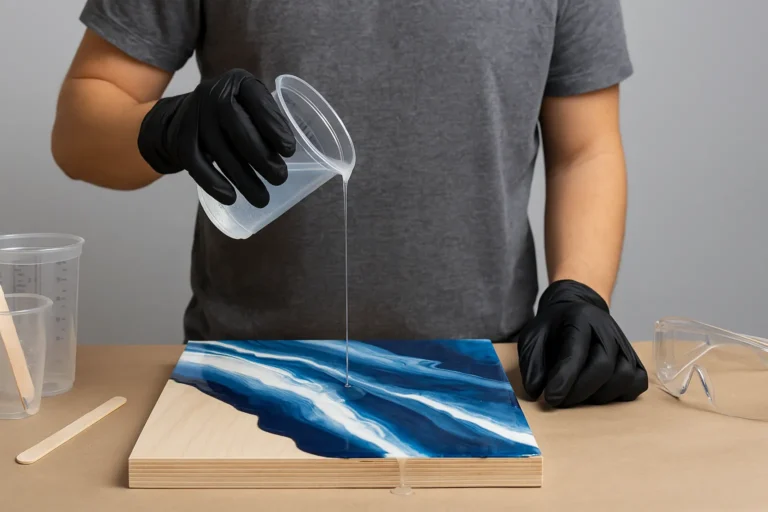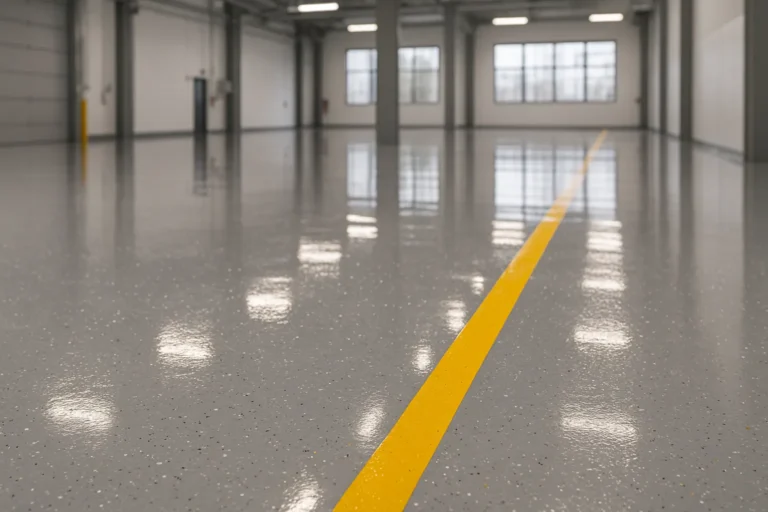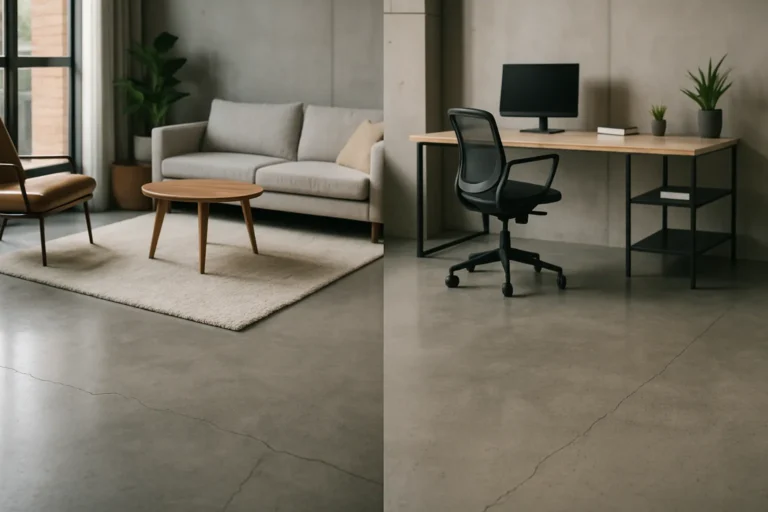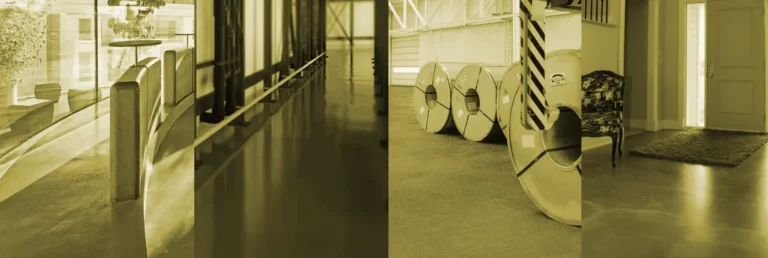When it comes to maintaining the aesthetic appeal and durability of your driveway in Dubai, selecting the right sealer is crucial. The choice between polyaspartic and acrylic driveway sealers can significantly impact the longevity and appearance of your concrete surfaces. This guide will help you understand the key differences and benefits of each option, ensuring you make an informed decision for your property.
Polyaspartic vs Acrylic Driveway Sealer Dubai: Key Differences and Benefits
Durability and Longevity Comparison
Polyaspartic sealers are renowned for their exceptional durability, often outlasting acrylic sealers. They provide a robust protective layer that can withstand heavy traffic and harsh weather conditions, making them ideal for Dubai’s climate. In contrast, acrylic sealers, while durable, may require more frequent reapplications to maintain their protective qualities.
- Polyaspartic Sealers: Long-lasting, withstands heavy traffic, ideal for harsh climates.
- Acrylic Sealers: Durable but may need frequent reapplication.
Application Process and Curing Time
The application process for polyaspartic sealers is relatively quick, with a fast curing time that minimizes downtime. This makes them a preferred choice for busy areas. Acrylic sealers, on the other hand, have a longer curing time, which might require more planning to avoid disruptions.
- Polyaspartic Sealers: Quick application, fast curing, minimal downtime.
- Acrylic Sealers: Longer curing time, requires careful planning.
UV Resistance and Color Retention
Polyaspartic sealers offer superior UV resistance, ensuring that the color of your driveway remains vibrant over time. Acrylic sealers, while offering some UV protection, may fade more quickly under the intense Dubai sun.
- Polyaspartic Sealers: Excellent UV resistance, long-lasting color.
- Acrylic Sealers: Moderate UV protection, potential for fading.
Chemical and Abrasion Resistance
Polyaspartic sealers provide excellent resistance to chemicals and abrasion, making them suitable for high-traffic areas. Acrylic sealers offer moderate resistance, which may be sufficient for residential driveways with less traffic.
- Polyaspartic Sealers: High chemical and abrasion resistance.
- Acrylic Sealers: Moderate resistance, suitable for less traffic.
Polyaspartic Sealer Dubai: Advanced Protection for High-Traffic Areas

Fast-Curing Properties for Minimal Downtime
Polyaspartic sealers cure rapidly, allowing for quick application and minimal disruption to daily activities. This is particularly beneficial for commercial properties or busy residential areas in Dubai.
Superior Adhesion to Concrete Surfaces
The superior adhesion properties of polyaspartic sealers ensure a strong bond with concrete surfaces, enhancing their protective capabilities and longevity.
Resistance to Harsh Weather Conditions
Dubai’s climate can be challenging, but polyaspartic sealers are designed to withstand extreme temperatures and humidity, providing reliable protection year-round.
Long-Term Cost-Effectiveness
While the initial cost of polyaspartic sealers may be higher, their durability and low maintenance requirements make them a cost-effective choice in the long run.
Benefits of Polyaspartic Sealers:
- Rapid curing and minimal downtime
- Strong adhesion to concrete
- Weather-resistant
- Cost-effective over time
Acrylic Driveway Coating Dubai: Affordable and Versatile Solution

Easy Application and Maintenance
Acrylic sealers are known for their ease of application, making them a popular choice for DIY projects. They also require minimal maintenance, which is ideal for homeowners looking for a hassle-free solution.
Wide Range of Color Options
Acrylic sealers offer a variety of color options, allowing homeowners to customize their driveways to match their aesthetic preferences.
Breathability and Moisture Resistance
Acrylic sealers are breathable, allowing moisture to escape from the concrete, which helps prevent cracking and other damage.
Eco-Friendly Formulation
Many acrylic sealers are formulated to be environmentally friendly, with low VOC emissions, making them a sustainable choice for eco-conscious homeowners.
Advantages of Acrylic Sealers:
- Easy to apply and maintain
- Customizable color options
- Breathable and moisture-resistant
- Eco-friendly
Factors to Consider When Choosing Between Polyaspartic and Acrylic Sealers
Climate and Environmental Conditions in Dubai
Dubai’s hot and humid climate can affect the performance of driveway sealers. Polyaspartic sealers are better suited for extreme conditions, while acrylic sealers may require more frequent maintenance.
Traffic Intensity and Expected Wear
Consider the amount of traffic your driveway will endure. Polyaspartic sealers are ideal for high-traffic areas, while acrylic sealers may suffice for residential driveways with less use.
Budget Constraints and Long-Term Value
While polyaspartic sealers have a higher upfront cost, their durability can offer better long-term value. Acrylic sealers are more budget-friendly initially but may require more frequent reapplications.
Aesthetic Preferences and Design Requirements
Your aesthetic preferences and design requirements will also influence your choice. Acrylic sealers offer more color options, while polyaspartic sealers provide a sleek, modern finish.
Considerations:
- Climate suitability
- Traffic and wear
- Budget and value
- Aesthetic and design
Application Techniques for Polyaspartic and Acrylic Driveway Sealers
Surface Preparation and Cleaning
Proper surface preparation is crucial for both polyaspartic and acrylic sealers. This includes cleaning the concrete thoroughly to ensure optimal adhesion.
Proper Mixing and Application Methods
Follow the manufacturer’s instructions for mixing and applying the sealer to achieve the best results. Polyaspartic sealers may require specific equipment for application.
Multiple Coat Applications for Enhanced Protection
Applying multiple coats can enhance the protective qualities of both polyaspartic and acrylic sealers, providing a more durable finish.
Curing and Maintenance Guidelines
Adhering to curing and maintenance guidelines will ensure the longevity of your driveway sealer, regardless of the type chosen.
Application Tips:
- Clean and prepare surfaces
- Follow mixing instructions
- Apply multiple coats
- Adhere to curing guidelines
Enhancing Curb Appeal with Polyaspartic and Acrylic Driveway Coatings
Decorative Options and Finishes
Both polyaspartic and acrylic sealers offer decorative options that can enhance the curb appeal of your property. From glossy finishes to textured surfaces, these sealers can transform the look of your driveway.
Color Selection and Customization
Acrylic sealers provide a wider range of color options, allowing for greater customization. Polyaspartic sealers, while more limited in color choices, offer a sleek and modern appearance.
Integrating Coatings with Landscape Design
Consider how your driveway sealer will integrate with your overall landscape design. Both polyaspartic and acrylic sealers can complement various styles, from contemporary to traditional.
Curb Appeal Enhancements:
- Decorative finishes
- Color customization
- Landscape integration
Maintenance and Reapplication of Polyaspartic and Acrylic Driveway Sealers
Cleaning and Care Instructions
Regular cleaning and maintenance are essential to preserve the appearance and functionality of your driveway sealer. Use mild detergents and avoid harsh chemicals that could damage the sealer.
Signs of Wear and When to Reapply
Monitor your driveway for signs of wear, such as fading or peeling. Reapply the sealer as needed to maintain its protective qualities and appearance.
Touch-Up Techniques for Damaged Areas
For minor damage, touch-up techniques can be used to restore the sealer’s appearance. This may involve applying a small amount of sealer to the affected area.
Maintenance Tips:
- Regular cleaning
- Monitor for wear
- Use touch-up techniques
Environmental Impact of Polyaspartic and Acrylic Driveway Sealers
VOC Content and Emissions
Both polyaspartic and acrylic sealers can vary in their VOC content. Opt for low-VOC formulations to minimize environmental impact and improve air quality.
Energy Efficiency and Heat Reflection
Some sealers are designed to reflect heat, reducing the surface temperature of your driveway. This can contribute to energy efficiency by lowering cooling costs.
Recyclability and Disposal Considerations
Consider the recyclability and disposal requirements of your chosen sealer. Proper disposal ensures minimal environmental impact and compliance with local regulations.
Environmental Considerations:
- Low-VOC options
- Heat-reflective properties
- Proper disposal
Successful Polyaspartic and Acrylic Driveway Projects in Dubai
Residential Applications and Results
Many homeowners in Dubai have successfully used polyaspartic and acrylic sealers to enhance their driveways. These projects demonstrate the transformative power of quality sealers.
Commercial Property Transformations
Commercial properties have also benefited from the durability and aesthetic appeal of polyaspartic and acrylic sealers. These projects highlight the versatility of these products.
Before and After Comparisons
Before and after comparisons showcase the dramatic improvements that can be achieved with polyaspartic and acrylic sealers. These visual transformations are a testament to the effectiveness of these products.
Project Highlights:
- Residential success stories
- Commercial transformations
- Visual improvements
Expert Tips for Selecting and Applying Driveway Sealers in Dubai’s Climate
Considering Temperature and Humidity Factors
Dubai’s climate requires careful consideration of temperature and humidity when selecting and applying driveway sealers. Choose products designed for extreme conditions.
Timing the Application for Optimal Results
Apply sealers during cooler parts of the day to ensure optimal curing and adhesion. Avoid application during peak heat to prevent issues.
Professional vs. DIY Application Considerations
While DIY application is possible, professional installation ensures the best results. Professionals have the expertise and equipment to apply sealers effectively.
Expert Advice:
- Consider climate factors
- Apply during cooler times
- Opt for professional installation
By understanding the differences between polyaspartic and acrylic driveway sealers, you can make an informed decision that enhances the beauty and durability of your property in Dubai. Whether you prioritize cost, aesthetics, or environmental impact, there’s a sealer that meets your needs.
FAQs
What is the lifespan of polyaspartic sealer compared to acrylic coating in Dubai’s climate?
Polyaspartic sealers generally have a longer lifespan than acrylic coatings in Dubai’s climate. They are designed to withstand extreme temperatures and UV exposure, providing durable protection for many years. Acrylic coatings may require more frequent reapplications due to their susceptibility to fading and wear.
Can polyaspartic sealer be applied over existing acrylic driveway coating in Dubai?
Yes, polyaspartic sealer can be applied over an existing acrylic coating, provided the surface is properly prepared. This involves cleaning and possibly roughening the surface to ensure good adhesion. It’s important to follow the manufacturer’s guidelines for the best results.
How does the cost of polyaspartic sealer compare to acrylic driveway coating in Dubai?
Polyaspartic sealers typically have a higher upfront cost compared to acrylic coatings. However, their durability and low maintenance requirements can make them more cost-effective in the long run. Acrylic coatings are more affordable initially but may incur additional costs due to more frequent reapplications.
Are polyaspartic sealers more slip-resistant than acrylic coatings for driveways in Dubai?
Polyaspartic sealers can be formulated to be slip-resistant, making them a safer option for driveways. Acrylic coatings can also be made slip-resistant, but the level of slip resistance may vary depending on the specific product used. It’s important to choose a sealer with the desired slip-resistant properties for safety.
Which sealer is better for protecting against oil stains on Dubai driveways: polyaspartic or acrylic?
Polyaspartic sealers offer superior protection against oil stains due to their chemical resistance. They create a strong barrier that prevents oil from penetrating the concrete surface. Acrylic sealers provide moderate protection but may not be as effective in preventing oil stains over time.
